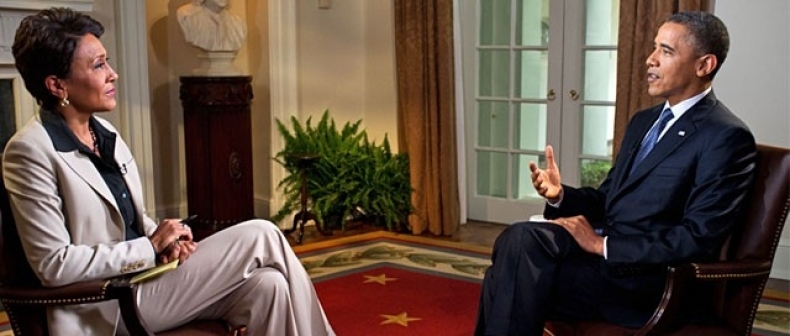
President Obama made history last week, when he became the first sitting U.S. president to endorse gay marriage. Speaking to Robin Roberts of ABC, Obama said that his position on the issue had been “evolving”, and that, “At a certain point, I’ve just concluded that for me personally it is important for me to go ahead and affirm that I think same-sex couples should be able to get married.”
While certainly devoid of the soaring rhetoric of some of his other pronouncements, Obama’s support of gay marriage marks a historic milestone. It was just 16 years ago that Bill Clinton, Obama’s Democrat predecessor, signed the Defense of Marriage Act, which defined marriage as the union of a man and a woman.
More than an exercise of presidential leadership, I think that Obama’s announcement demonstrates just how far public opinion has swung in recent years. Back in 2004, I worked in the U.S. Senate when the issue of gay marriage was a hot topic of debate. I remember the influx of mail that our office received from constituents weighing in on the prospect of gay marriage, and suffice it to say that the vast majority of them were opposed (usually quite vehemently). The fact that recent polls show that around 40-50% of Americans now support legalized same-sex marriage shows how the political winds have changed since then.
Even though the American population seems quite split on the issue, the question of whether Obama’s endorsement was a political error is a genuine and important one.
Make no mistake: for Obama, this was a political decision as much as anything. The fact that he made the announcement in an election year is no coincidence, and he has now ensured that the topic will be an important part of the debate with his Republican opponent, Mitt Romney.
Obama’s motivation for doing so appears to be multifaceted. For one thing, with the “etch-a-sketch” Romney likely planning a shift to the political center, Obama probably wants to make a clear contrast between the two candidates. The fact is that for all the rhetorical bluster we are likely to hear in the coming months, Obama and Romney are not as far apart in their politics as they’d have you believe. They both aspire to moderate pragmatism, and their views on the substance of many issues are quite similar.
Where Obama is most insecure- and where Romney is ostensibly most compelling- is on the economy. The American economy is recovering, but it still suffers from the effects of the financial crisis, and opinions of Obama’s performance in the area are middling at best. The more the election turns on the economy, the worse it is for Obama and the better it is for Romney. The infusion of social issues such as same-sex marriage into the campaign will help distract from that area, or so Obama hopes.
Furthermore, American presidential elections largely turn on the support of independent voters, and Obama’s endorsement of gay marriage appears to be in large part a gambit to appeal to this group, which has been increasingly supporting Romney’s bid. According to a recent Politico poll, 57% of independents support same-sex marriage.
Perhaps most importantly, in politics, it’s always about money. A New York Times piece shortly before Obama’s announcement revealed the depth of disenchantment with Obama in the Wall Street community and the administration’s belief that its fundraising performance would likely pale in comparison to that of 2008. Obama was going to need to compensate by raising more funds from other groups, such as Hollywood and the gay community. At a fundraiser hosted by George Clooney following the announcement, Obama was able to raise $15 million.
There do appear, then, to be compelling political reasons for Obama’s announcement, but it’s also fraught with risk. Predictably, traditionalist and religious groups were up in arms about the announcement, decrying the prospect of same-sex marriage and pledging to do whatever it takes to defeat Obama at the polls in the fall.
Normally this wouldn’t be that big of an issue because such groups were not likely to support a Democrat anyway, but it was a political gift to Romney. The Republican candidate has struggled to win the support of conservatives who really don’t trust him, but this move is likely to coalesce most Republicans around Romney, as the lesser-of-two-evils option.
On a related note, while American opinions on gay marriage are relatively split, the nature of support on either side of the question cannot be equivocated. Those opposed to gay marriage are generally more emphatic about their opinion than those in favour of it, and as such Obama has given conservative activists a powerful galvanizing cause that may not be matched on the liberal side.
Electorally, there are also real concerns. The quirky American electoral college system means that presidential elections do not turn on the popular vote, which Al Gore so famously found out back in 2000. They rather hinge on the outcomes of a select few swing states, and in many of these it is hard to imagine Obama’s support for same-sex marriage helping his cause. Take for example North Carolina, which Obama carried in 2008, and which last week passed a constitutional amendment banning gay marriage by over 20% of the vote.
Finally, Obama’s move was essentially tantamount to preaching to the converted. The gay community was likely to support Obama strongly in the upcoming election, regardless of whether or not he voiced his support for same-sex marriage. His decision to not enforce the Defense of Marriage Act and his successful push to repeal the “don’t ask, don’t tell” law in the military had him already in good stead with gay voters. Surely Obama’s endorsement will only strengthen that support, but the wider political consequences of his announcement are to this point uncertain.
______
Matthew Frisch writes Foreign Desk for Toronto Standard. Follow him @mfrisch.
For more, follow us on Twitter at @TorontoStandard and subscribe to our newsletter.














